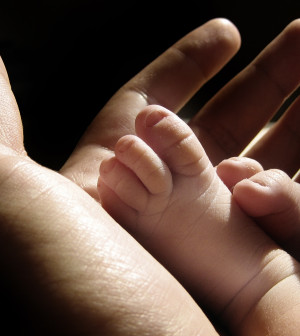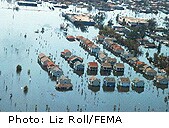- The Best Time of Day to Drink Bone Broth to Maximize Health Benefits
- 8 Ways to Increase Dopamine Naturally
- 7 Best Breads for Maintaining Stable Blood Sugar
- Gelatin vs. Collagen: Which is Best for Skin, Nails, and Joints?
- The Long-Term Effects of Daily Turmeric Supplements on Liver Health
- Could Your Grocery Store Meat Be Causing Recurring UTIs?
- Are You Making This Expensive Thermostat Error This Winter?
- Recognizing the Signs of Hypothyroidism
- 10 Strategies to Overcome Insomnia
- Could Artificial Sweeteners Be Aging the Brain Faster?
Stillbirths Higher After Hurricanes Katrina And Rita: Study


The risk of stillbirth among pregnant women greatly increased following hurricanes Katrina and Rita, a new study shows.
Katrina struck Louisiana on Aug. 29, 2005, and Rita struck on Sept. 24 that same year. Both hurricanes caused widespread property and infrastructure damage, along with many deaths and injuries.
In this study, researchers investigated the risk of stillbirth among pregnant women in damaged and undamaged areas in the 28 months after Katrina struck.
Compared to undamaged areas of Louisiana, the risk of stillbirth was 40 percent higher in areas where 10 percent to 50 percent of housing had been damaged, and more than twice as high in areas were more than 50 percent of housing had been damaged, according to Sammy Zahran and colleagues from Colorado State University.
After accounting for other known risk factors, the researchers calculated that every 1 percent increase in the extent of damage to housing was associated with a 7 percent rise in the number of stillbirths. Based on those figures, the investigators concluded that up to half of the 410 stillbirths in extensively damaged areas may have been the direct result of the hurricanes and the damage they caused.
Their estimates suggest that stillbirths accounted for about 18 percent to 30 percent of all the deaths that occurred in the wake of the hurricanes, according to the study published online May 8 in the Journal of Epidemiology & Community Health.
Previous research has found a link between stress, depression and mental trauma in pregnant women and increased risk of birth complications, including stillbirth, the study authors said.
They noted that climate change could lead to more and stronger hurricanes, resulting in increased risk to pregnant women and their unborn babies.
Although the study has found an association between hurricanes and the risk of stillbirth, it can’t definitively prove that the storms were the cause of the increase in stillbirths.
More information
The U.S. National Library of Medicine has more about stillbirth.
Source: HealthDay
Copyright © 2026 HealthDay. All rights reserved.










